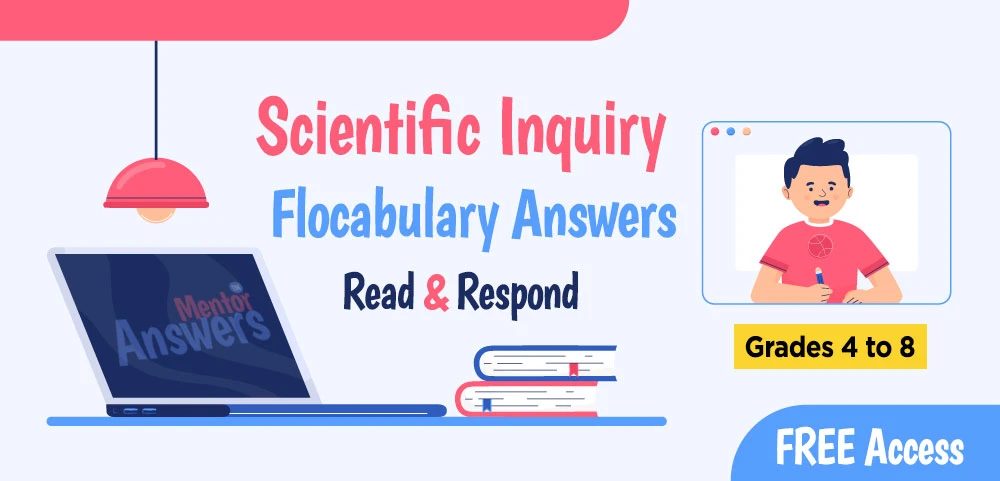Are you looking for a reliable source of answers for the Scientific Inquiry Flocabulary Quiz, Read & Respond? You’ve come to the right place!
We have a team of teachers who have checked and verified the correct answers for all the questions. You can trust our expertise and save time by using our answers key.
Scientific Inquiry Flocabulary Quiz Answers Key
- Jon claims that cities are better than towns. He finds 12 people who agree with him as evidence to support his claim.
- Kyra starts to believe in vampires after she sees a movie that has vampires in it.
- Pedro plants a sapling in his front yard. He observes and measures it each day. Using his observations, he hypothesizes that the leaves grow most in the spring.
- Justine drinks eight glasses of water every day because she saw a presentation in health class about water being good for you.
- a famous athlete’s speech
- a religious text
- superstitions and folklore
- experiments and studies
- Sandra’s claim is a hypothesis that she could test with the scientific method.
- Sandra’s claim is not scientific because it is not testable.
- Sandra’s claim is a law based on empirical evidence.
- Sandra’s claim is not scientific because no one famous would agree with her.
- dogs are good pets
- dogs can speak English
- dogs have two eyes and two ears
- pet dogs should be allowed at school prom
- People have the right to a speedy trial.
- Any two objects in the universe attract each other with a force called gravity.
- The universe may have begun from an explosion (or big bang) from a single point.
- Students must wear their safety goggles in the lab.
- guess that some scientists believe.
- guess that once was a hypothesis and might one day become a law.
- well-tested explanation for a wide range of observations or experimental results.
- law that scientists no longer like and are trying to modify.
- the hypothesis that if you increase the temperature of water, then sugar will dissolve quicker
- the statement that objects in motion tend to stay in motion
- a belief in ghosts that humans cannot see or feel
- an explanation of why global temperatures are rising
- A law can describe a phenomenon, and a theory can give a possible explanation for it.
- A theory can state a simple guess, and a law can give more evidence to support it.
- Scientists might not believe in scientific laws, but everyone believes in scientific theories.
- A law has more hypotheses to test than a theory does.
- True
- False
- A claim that pretends to be scientific but has not actually been tested
- A hypothesis that the results did not support
- A theory that has been modified based on new evidence
- A law that describes a phenomenon observable only at some scales
Scientific Inquiry Flocabulary Read & Respond Answers
Expand your knowledge by exploring the Read & Respond answers related to the topic of our Subject:
- If ghosts are real, how do they move?
- If a factory opens in a city, how will it affect air quality?
- How does sunlight affect plant growth?
- If a person starts exercising, how will their health change?
- should never be replicable and repeated.
- helps scientists understand the natural world.
- will always make a hypothesis true.
- comes from made up stories about the world.
- the presence of empirical evidence
- the use of a famous athlete for support
- the support of a respected scientist
- the use of the scientific method
- They are also called principles.
- They are universal statements.
- They can sometimes be stated as equations.
- All of the above.
- Certain areas on the West Coast of America are more prone to earthquakes.
- Fossils are typically found by paleontologists working with geologists.
- Fossils of lion skulls show that lions used to look different.
- Animals today share the exact same traits as animals from millions of years ago.
- when new observations are made with updated tools
- when a celebrity says a theory is wrong
- when scientists don’t like the existing theoretical model
- when the existing theory is considered too negative or grim
- cannot be used to predict when the next lunar eclipse will occur.
- cannot represent any natural phenomenon we observe on Earth’s surface.
- accurately depicts all the topographical features on the planet.
- cannot be used to find the distance between China and Australia.
Are you interested in delving into additional subjects and Lessons related to Flocabulary? Check Here To Get All Flocabulary Answers Key
If you have any questions or need more answers key for your favorite subject, please leave a comment below or contact us through our website. We would love to hear from you and assist you in your learning journey.

